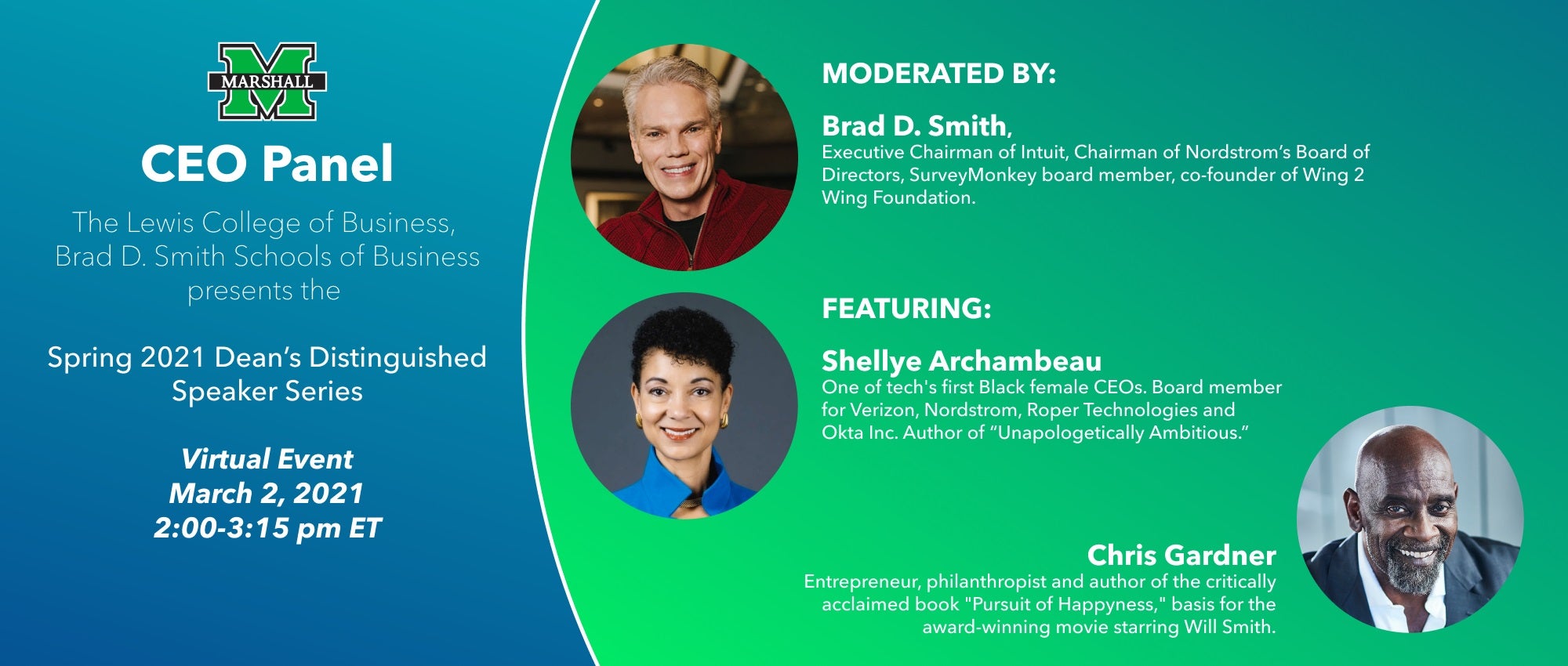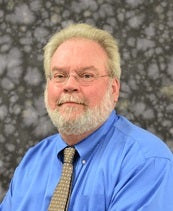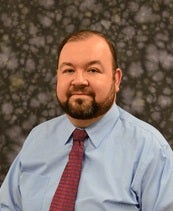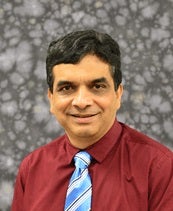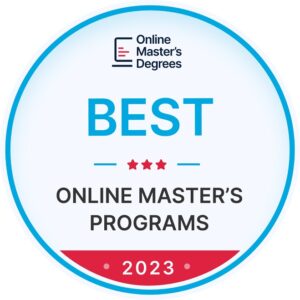Featuring: Shellye Archambeau – former CEO of Metric Stream; board member for Nordstrom, Verizon, Roper Technologies, and Okta Inc.; author of “Unapologetically Ambitious” and Chris Gardner – Entrepreneur, philanthropist and author of “Pursuit of Happyness”. Moderated by Brad D. Smith – Executive Chairman and Former President and CEO of Intuit.
Date: March 3, 2021
The Lewis College of Business and its Brad D. Smith Schools of Business at Marshall University hosted the third CEO Panel, via Zoom, on Wednesday, March 3, 2021. Thanks to our speakers and panel members, students, alumni, faculty, staff, community members, business leaders, government officials, university administrators, and board members for joining us for this highly engaging panel discussion. Brad D. Smith joined guest panelists Shellye Archambeau, one of tech’s first Black female CEOs, and Chris Gardner, author of “Pursuit of Happyness.” Their stories of overcoming insurmountable odds, shattering glass ceilings, and investing in the next generation are awe-inspiring! The event was live streamed on NBC local affiliate WSAZ Channel 3. Close to 1,000 people attended the Zoom event and more than 6,000 people have watched the WSAZ live stream (with more than 9,000 duplicated viewership for the post-show coverage) to hear insights and advice from three of the world’s top business leaders.
The Lewis College of Business, celebrating its 50th anniversary, offers contemporary, cutting edge, and applied business education and research while being rooted in the region’s economic and business development. Re-imagined by a transformational gift by Brad and Alys Smith in 2018, the Brad D. Smith Schools of Business have identified experiential learning as the DNA of our academic programs in business. The Dean’s Distinguished Speaker Series was started in 2018 as the highest profile community event of the Brad D. Smith Schools of Business, offering a rich and vibrant experience to our students and various other stakeholders as they learn from renowned c-suite executives, entrepreneurs, intrapreneurs, and industry leaders about business successes, effective leadership and the future of work. As a part of this series, the CEO Panel, put together by Brad D. Smith and his team at Intuit, brings globally recognized top-tier business leaders to provide insightful perspectives through dynamic discussions covering a broad range of topics that influence the world of business and draw powerful lessons from the boardroom to the classroom.
The theme for this panel was “Creating Success On Your Own Terms.” Talent is dispersed equally, but opportunity is not. Rapid technological, environmental and societal shifts are driving the lack of economic opportunity in communities across the globe. The current health and economic crises are speeding up these shifts even more. In this fireside chat, Marshall students and local community leaders heard from three leaders in tech to discuss the skills and mindsets needed to lead and succeed in today’s landscape. The goal of this fireside chat was to provide insight and inspiration for the audience and further encourage them to apply their talent and energy to pursue their passion and create opportunities for themselves and their communities. Together, communities, corporations and academia can shape the world for future generations to thrive.
Shellye Archambeau is the former CEO of MetricStream, a GRC company based in Palo Alto, California. She has held executive positions for numerous companies, including a 15-year career at IBM where she became the first African American woman at the company to be sent on assignment internationally. Archambeau is a guest lecturer at her alma mater, the Wharton School of the University of Pennsylvania. She is also a writer, co-authoring the book Marketing That Works, and a regular contributor for Xconomy.
Archambeau currently sits on the boards of Nordstrom, Verizon, Roper Technologies and Okta Inc. She advises the Royal Bank of Canada, Capital Markets, and Forbes Ignite as well as growing startups. She is regularly named on Who’s Who lists in technology and is the protagonist of the Harvard Business School Case Study: Becoming a CEO. She is also the author of the book, Unapologetically Ambitious: Take Risks, Break Barriers and Create Success on Your Own Terms. Archambeau is a Forbes contributor, runs a gourmet dinner club, and writes a blog that provides career advice, insight and other musings from her career (https://shellye.com).
Chris Gardner is a stockbroker and philanthropist whose rise to prominence provided the basis for both his memoir, The Pursuit of Happyness, and a successful Hollywood film of the same name. From a poor background, Gardner endured a year on the streets of San Francisco as a homeless single father and came out the other side a multimillionaire financial manager. founded his own brokerage firm Gardner Rich & Co in 1987. In 2006, Gardner sold his minority stake in the firm and wrote his memoir. He insists the meaning of his life is no mere fulfillment of the American dream of financial success. In an interview included on the DVD release of The Pursuit of Happyness, he said, “My story has been portrayed in certain media outlets as a rags-to-riches story. That ain’t important. The important thing is the commitment to my children, to be there.”
For more on Chris Gardner visit his webpage at: https://www.chrisgardnermedia.com/biography
Brad D. Smith introduced the panel by saying: “They exemplify what it means to dream big, to actually overcome seemingly insurmountable obstacles. They have the ability to break glass ceilings and, most importantly, they inspire through their example the best in others. Anybody can be successful, but not everybody can be successful on their own terms. It takes hard work, and plenty of dedication.” “Through these last 12 months each of us has endured severe weather events, the pandemic, social inequity, racial injustice, some political turmoil and economic upheaval, and we’re not even out of the woods yet, but we are still standing and that is a testament to the statement that if bad times are followed by good reflections, you can create amazing opportunity, and that’s what today’s event is all about, ” said Smith, who served as the panel moderator.
“Brad shared with you a lot of accomplishments I had,” Archambeau said. “But, I have to tell you I had no business achieving those. When I was little, and you think back those decades ago, you wouldn’t have seen the person you see today.” Shellye Archambeau encouraged everyone to do a stint in sales. “I learned more in sales by caring about customers than I learned in frankly any other job… All ‘no’ means is not now, which gives you the opportunity to figure out ‘okay, why not now?’ and when you find out the ‘why not now’ that’s the roadmap to how to get a ‘yes,’ and I have used that strategy throughout my entire career so when people say no I’m like yes because that gives me the chance to ask the most powerful question which is why not.”
Gardner said he sees young people wanting to make a change in the world, pointing to peaceful protests for the Black Lives Matter movement. He said that today’s college-age youth were born in turbulent times and desire positive change. Gardner said they were conceived in the uncertainty of Y2K, their worst memories were 9/11 and the wars in Iraq and Afghanistan, and they saw what the financial collapse of the mid-2000s did to their families. “What’s the one constant in that timeline,” Gardner asked. “Big, dramatic, frightening change.” Gardner realized from an early age that he needed to make his dreams come true, and that nothing would be handed to him. “I had a discussion with my mom when I was younger,” Gardner said. “She said you could do or be anything. She did not say you can have anything.” It motivated Gardner to make himself into something. He chased the American Dream, and said that young people should continue to do so today. There are, however, changes to how that is done. “The biggest change in the American Dream is that it’s gone global,” Gardner said. “When I talk to young people, I stress to them that globalization and technology means that your competition is not just in your classroom. The people you’re competing with are someplace all around the world. While you are being young and having fun, the people you’re competing with are grinding away. That’s going to make the difference between who signs the front of the check and who signs the back,” Gardner said.
Brad Smith said, “It’s a real treat to hear their messages being communicated to the next generation, knowing that it will inspire them and give belief they can do anything as well.” Smith answered one audience member’s question about having to leave West Virginia to succeed, saying, “Create the future you want. 75 percent of net new jobs are created by start-ups, and we have a real opportunity in West Virginia to create the next Amazon, the next Intuit, the next MetricStream. All these companies are coming to you through remote work, and we have an exciting set of initiatives that will be coming where people will be able to participate with the Silicon Valley or Wall Street without ever leaving the beautiful mountains of West Virginia.”
The video for the event is available at: https://www.youtube.com/watch?v=-bl8RPYaU4Q
Featuring: Jeff Weiner – Executive Chairman and Former CEO of LinkedIn. Moderated by Brad D. Smith – Executive Chairman and Former President and CEO of Intuit.
Date: Wednesday October 21, 2020
The Brad D. Smith Schools of Business and its Dean’s Distinguished Speaker Series at Marshall University, hosted the second CEO Panel virtually on Zoom on Wednesday, October 21. You might remember our highly successful first CEO Panel held on February 19 at the historic and majestic Keith Albee Performing Arts Center in Huntington. Thanks to our speakers and panel members, students, alumni, faculty, staff, community members, business leaders, government officials, university administrators, and board members for joining us for this highly engaging CEO Panel discussion. Brad D. Smith, Executive Chairman and former President & CEO of Intuit, engaged in a fireside chat with Jeff Weiner, the Executive Chairman and former CEO of LinkedIn. These two Silicon Valley CEOs of world-renowned corporations shared their advice, offered personal anecdotes and reflections, and answered student questions.
The Lewis College of Business, celebrating its 50th anniversary, offers contemporary, cutting edge, and applied business education and research while being rooted in the region’s economic and business development. Reimagined by a transformational gift by Brad and Alys Smith in 2018, the Brad D. Smith Schools of Business have identified experiential learning as the DNA of our academic programs in business. The Dean’s Distinguished Speaker Series was started in 2018 as the highest profile community event of the Brad D. Smith Schools of Business, offering a rich and vibrant experience to our students and various other stakeholders as they learn from renowned c-suite executives, entrepreneurs, intrapreneurs, and industry leaders about business successes, effective leadership and the future of work. As a part of this series, the CEO Panel, put together by Brad Smith and his team at Intuit, brings globally recognized top-tier CEOs to provide insightful perspectives through dynamic discussions covering a broad range of topics that influence the world of business and draw powerful lessons from the boardroom to the classroom.
Former Marshall University President Jerry Gilbert introduced Brad D. Smith to the audience, who in turn introduced Jeff Weiner. Brad Smith started by saying: “This speaker series is designed to bring the most forward-thinking leaders from the most innovative companies to share their insights and to engage directly. I believe the strongest steel is forged in the hottest flames and I believe that this opportunity is for us to transform this existing challenging reality into an amazing and exciting new chapter for us as individuals, for the university, and for society as a whole, but to do that we have to embrace the old adage that bad times when followed by good deep reflection can lead to the greatest opportunities and that’s what today’s conversation is designed to do.”
The theme of the panel discussion was “Leadership and Teamwork.” Talent is dispersed equally, but opportunity is not. Rapid technological, environmental and societal shifts are driving the lack of economic opportunity in communities across the globe. The current health and economic crises are speeding up these shifts even more. In this fireside chat, Marshall students and local community leaders heard from two leaders in tech to discuss the skills and mindsets needed to lead and succeed in today’s landscape. The goal of this fireside chat was to provide insight and inspiration for the audience and further encourage them to apply their talent and energy to pursue their passion and create opportunities for themselves and their communities.
Weiner reflected on his leadership philosophy. “I would answer that question in two ways. One is a definition of my own, the other would be a framework. The definition for me of leadership is the ability to inspire others to achieve shared objectives. For me, the most important word there is to inspire. That is what leadership is all about and it separates leaders from managers. Managers tell people what to do, leaders inspire them to do it. And I believe inspiration comes from three dynamics. The first is the clarity of vision. The second is the courage of your conviction. And the third is your ability to effectively communicate both of those things.”
Brad Smith talked about the need for teams to make the best quality decisions at the fastest velocity possible. Jeff Weiner added: “What comes to mind immediately is focus, first and foremost. Now some may immediately think I am talking about the idea of focus and I am, but we developed an acronym around the word focus, FCS. The F is fewer things done better, the C is communicating the right information to the right people at the right time. And S is the speed and quality of our decision making.”
A student asked a question about how to foster innovation in an organization. Weiner talked about three ingredients that help create an innovative environment within an organization. “The first is talent and making sure you have rule breakers, you can’t have all rule breakers otherwise you will have anarchy, but if you have no rule breakers you are not going to get that break. You are not going to get that innovation, you are not going to get people who question conventional wisdom and looking to do things differently. You need to have people who are willing and not only willing but want to do things differently . . . The second is the culture, and it’s a culture that fosters innovation, that allows for people to fail, and in fact celebrates that people took a chance as opposed to condemning anything less than perfect success because that is going to stifle innovation. And third, it’s about the infrastructure and often times this is the one pillar that gets overlooked. If you don’t have the right infrastructure to encourage innovation, to invest in innovation, to allow for innovation to take place, not only is it not going to happen, you are going to stifle those very same people who you are trying to innovate.”
Together, communities, corporations and academia can shape the world for future generations to thrive. Thank you for supporting the Distinguished Speaker Series at Marshall University as we strive to create impact, innovation and engagement for business and business education in our Mountain State.
The video for the event is available at: https://www.youtube.com/watch?v=eXkTg8pMeDk&feature=youtu.be
Featuring: Shantanu Narayen – Chairman, President, and CEO of Adobe, and Daniel Schulman – President and CEO of PayPal. Moderated by Brad D. Smith – Executive Chairman and Former President and CEO of Intuit
Date: Wednesday, February 19, 2020
The Brad D. Smith Schools of Business and its Dean’s Distinguished Speaker Series at Marshall University, hosted the Inaugural CEO Panel, sponsored by Mountain Health Network, on February 19, 2020, at the historic and majestic Keith Albee Performing Arts Center. Thanks to our speakers and panel members, students, alumni, faculty, staff, community members, business leaders, government officials, university administrators, and board members for joining us for this highly engaging panel discussion. Brad D. Smith joined guest panelists Shantanu Narayen, Chairman, President and CEO of Adobe, and Daniel Schulman, President and CEO of PayPal, onstage. Three CEOs, former and current, of world-renowned corporations shared their advice, answered questions and even accepted an audience member’s resume during the inaugural CEO panel. Over 1,800 people packed the historic Keith Albee Performing Arts Center to hear insights and advice from three of the world’s top CEOs.
The Lewis College of Business, celebrating its 50th anniversary, offers contemporary, cutting edge, and applied business education and research while being rooted in the region’s economic and business development. Reimagined by a transformational gift by Brad and Alys Smith in 2018, the Brad D. Smith Schools of Business have identified experiential learning as the DNA of our academic programs in business. The Dean’s Distinguished Speaker Series was started recently as the highest profile speaker series of the Brad D. Smith Schools of Business, offering a rich and vibrant experience to our students and various other stakeholders as they learn from renowned c-suite executives, entrepreneurs, intrapreneurs, and industry leaders about business successes, effective leadership and the future of work. As a part of this series, the inaugural CEO Panel brought these three top-tier business leaders to Huntington to provide insightful perspectives through dynamic discussions covering a broad range of topics that influence the world of business and bring powerful lessons from the boardroom to the classroom. These CEOs are internationally respected business leaders who have an excellent reputation and a powerful story to tell.
The theme of the panel discussion was “Powering Possibilities.” Talent is dispersed equally, but opportunity is not. Rapid technological, environmental and societal shifts are changing the rules of how emerging talent can seize economic opportunities in communities across the globe. In this panel discussion, our stakeholders will hear from these industry leaders as they discuss the skills and mindsets needed to succeed in today’s economic landscape. Together, communities, corporations and academia can shape the world for future generations to thrive. “
I believe this moment in time represents a crossroad,” said Smith, who served as the panel moderator. “It’s an intersection between our historical accomplishments and our future possibilities, possibilities for each and every one of us as individuals, possibilities for Marshall, WVU, the other state universities and colleges and the students that they teach, and possibilities for this great state of West Virginia.” Smith said as proud as he is of West Virginia’s accomplishments, he believes the time has come for change. “
It’s time for us to reimagine and transform ourselves, and in doing so prepare the next generation for the world they are about to inherit,” he said. “The world we are living in now is rapidly evolving. While new technologies bring magic to our lives in ways we couldn’t imagine just 10 years ago, they also bring change and disruption of jobs and of industry. They also accelerate the pace of change 10 times faster than we were experiencing just a decade ago,” he said. “That is an amazing and yet somewhat concerning future.”
Smith said we are facing something called the 75% reality. “The 75% reality is the digital generation right now … 75% of them actually want to own their own businesses,” he explained. “They want to start their own company. They don’t want to go to work for another company.” Smith said the second 75% reality is that 75% of all new jobs around the world are created by small businesses and startups. “The third 75% reality is that 75% of venture capital money went to three places — California, New York and Massachusetts,” Smith said. “We are here to change that in West Virginia.”
Smith said there are bright spots all around West Virginia. “Our policymakers on a federal and state level are shaping policy that evens the playing field so we can participate,” he said. Smith said there are also exciting things happening with companies in the state. “You have tech companies like Infor coming to Charleston, you have Core10 teaching coding skills and you have my own company, Intuit, opening up a prosperity hub in Bluefield and creating hundreds of jobs,” he said. “We have our work cut out for us, but I stand before you today as an optimist.”
Smith said he sees two trails to the future for West Virginia. “Education and entrepreneurship,” he said. “They are the great equalizers that level the playing field and transform tough realities into amazing possibilities. This is an example today of what Marshall, WVU and other schools are doing by bringing world-class leaders into our state, learning from their insights and experiences and helping us figure out how we can expose our talent to them so they know where great talent resides … right here in West Virginia.”
Narayen said he believes Silicon Valley became such an unbelievable place for business because of education. “I think investing in talent is vital,” he said. “Everybody asks why are we not starting a company here or starting an office here, but the truth is that we go where the talent is, so there is nothing more important than education and investing in the workforce. The truth is we allow the best people to work from wherever they want. The reality is that anywhere you go in the world right now, with a computer, you have access to capital Access to capital is actually not the big differentiator. The big differentiator is access to talent. Get that next generation of talent, and that’s where every single company will go.”
Schulman said the talent you need depends on the position, but companies are looking for all types of talent. “Everyone thinks all the tech companies are only looking for software engineers, but we look for people who are excellent in finance, in operations, in marketing and sales and customer operations,” he said. “Location is becoming increasingly less important. That is also becoming a great equalizer as well, because people can work remotely today because of all of the new technologies to do your job.”
Schulman said there are very few people who actually know what they are going to be doing 10 years from now, so he advises job seekers and entrepreneurs to just take the next step and learn from it. “Whatever that next job is, there are going to be some really bad experiences and some great ones,” he said. “What you really like doing, you will excel at, and things you hate doing, you probably are going to do well. The only way to do that is through experience and taking that first step.”
John Donahoe, CEO of Nike, was scheduled to participate in Wednesday’s panel but was unable to attend. He sent in a video clip following in the themes of the panel. “We all deeply admire current and future leaders like yourself that exhibit the grit, perseverance and determination that it takes to lead,” Donahoe said in the video.
U.S. Senators Shelley Moore Capito and Joe Manchin, WV Senate President Mitch Carmichael, Secretary of State Matt Warner and Representative Carol Miller, as well as Huntington Mayor Steve Williams and WVU President Gordon Gee, attended the event and were recognized by former President Jerry Gilbert.
The event concluded with panel members receiving gifts from the Lewis College of Business. Thank you for supporting the Distinguished Speaker Series at Marshall University as we strive to create impact, innovation and engagement for business and business education in our Mountain State.
Link to Event Recording:
https://www.facebook.com/herdbusiness/videos/274973933465640/?t=2
